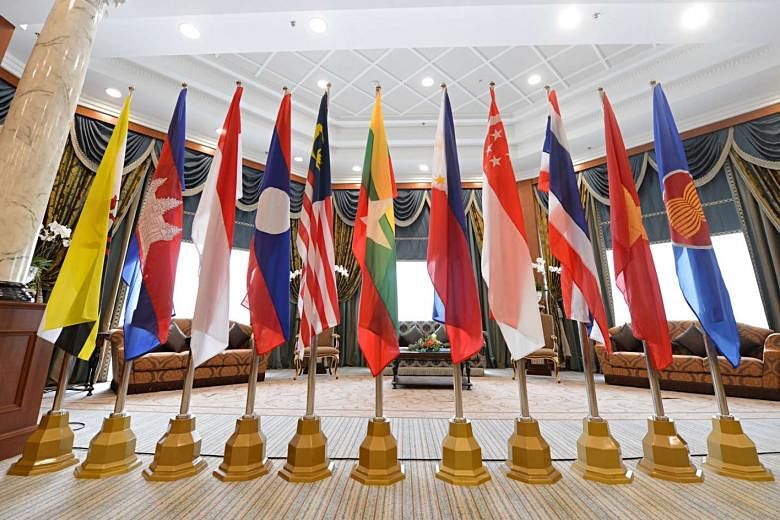Indonesia has a leadership role to play to maintain Asean centrality and neutrality. Southeast Asia should not only be a proxy for major power rivalries.
By Wirya Adiwena
The Jakarta Post/Asia News Network
In the wake of the US-Asean Sunnylands Summit in February, a lot has been said about how Asean matters for great powers.
It is a historical time for US-Asean relations.
However, in light of the recent Asean foreign ministers retreat in Laos, we need to ask: What does Asean mean today for its member countries?
In the face of the increasingly influential political and economic powerhouse that is China, member countries' commitment to Asean centrality has been constantly challenged.
In 2012, member countries failed to reach a consensus under Cambodia's chairmanship.
In 2015, under Laotian chairmanship, the country was increasingly seen to veer closer toward China.
For many, this is not a surprise.
After all, Asean has not been able to truly fulfill the expectations of its members.
Even with the Asean Economic Community (AEC), trade volume between Asean member countries remains lower than trade with countries outside of the region.
In an earlier column, Ari Margiono pointed out that not only is intra-Asean trade low (only 25 per cent of total trade volume in the region), it is also dominated by companies from Singapore, Malaysia and Thailand.
Inequality among member countries also persists.
The implementation of Initiatives for Asean Integration (IAI) to reduce gaps between member countries also faces its own challenges.
The projects in the IAI Work Plan's second phase address only 58 of the 182 priority actions proposed to support development in Cambodia, Laos, Myanmar and Vietnam - this leaves 124 priorities unaddressed.
China fills this gap by pumping in investment and aid.
Indeed, China recently announced its commitment to providing US$10 billion (S$13.5 billion) in infrastructure loans and US$560 million in aid to Asean members.
This includes the Laos-China high-speed railway, which will strengthen connectivity between southern China and Southeast Asia and promote growth in the area.
This is also a move that will strengthen China's position as a prominent intervening variable in intra-Asean relations.
It is understandable that countries like Laos are welcoming Chinese investment.
After all, the call for infrastructure development is urgent and major regional powers like Indonesia are answering this call and opening their doors to China.
Indeed, the administration of President Joko "Jokowi" Widodo has been giving signals that it is pursuing a policy of hedging in the midst of this great power rivalry.
Through this policy, Indonesia is promoting closer ties with rival powers - US, China, Japan - to promote the national interest, most notably through inviting more investment.
The construction of the Jakarta-Bandung high-speed railway is testament to this policy.
As some observers have said, the Jokowi administration is bringing more meat to the foreign policy table beyond the perceived pomp and aplomb of the era of President Susilo Bambang Yudhoyono.
Unfortunately, this policy is also followed by what many see as decreasing engagement with Asean, even with President Jokowi's attendance at Asean summits, and despite continuous efforts and assurances from Foreign Minister Retno Marsudi and Jokowi's former foreign policy aide Rizal Sukma that Indonesia is not abandoning Asean.
If Indonesia truly wants to enact a policy of hedging, it is important to maintain Asean centrality and neutrality. Southeast Asia should not only be a proxy for major power rivalries.
Asean countries should not be confined to the periphery.
There are many ways to achieve this.
Policy recommendations have been made by pundits throughout the world: from wide-aiming recommendations such as improving the implementation of IAI, or using Asean Development Goals as a policy framework to narrow the development gap; to technical proposals such as assistance to develop agriculture in the Mekong region, and capacity building for women entrepreneurs.
These are all important.
However, there is one thing that only Indonesia can do as major regional player - play a role as a "big brother."
Indonesia can take a leadership role in the region. More importantly, it has the capacity to do so.
In the aftermath of the deadlock in the 2012 Asean Summit, for example, then Foreign Minister Marty Natalegawa conducted shuttle diplomacy across the region.
It is widely believed that Cambodia was using its position as chairman to block any strong statements regarding the South China Sea to curry the favor of Beijing.
However, Marty managed to persuade leaders in the region to agree on a common position.
Thus, pomp and aplomb still have their uses in international fora. At times, serving meat at the table does not mean that we have to strip the bones bare in the process.
When promoting its public policies, the government often quips that the people need to know that governments are there for them.
But this means not only that the government needs to do things, they also need to be seen to doing them. Our neighbours also need to see that Indonesia still cares about Asean.
They need to believe that, especially for Indonesia, Asean still matters.
* The writer is head of international relations at the Habibie Centre in Jakarta.

